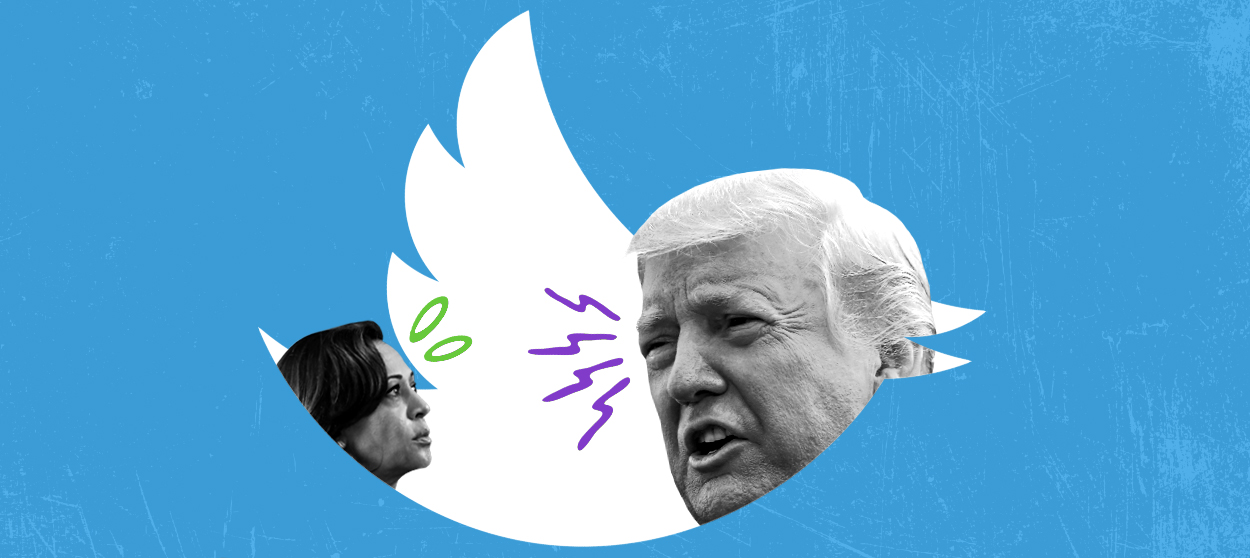Why banning Trump from Twitter won't solve anything
Shouldn't his lawyers be handling that?


A free daily email with the biggest news stories of the day – and the best features from TheWeek.com
You are now subscribed
Your newsletter sign-up was successful
This past week, Sen. Kamala Harris wrote Twitter CEO Jack Dorsey requesting that the social media platform suspend President Donald Trump's account. The senator's letter detailed the president's use of Twitter to target the whistleblower of the Ukraine scandal, activity that, Harris explained, appeared to violate the company's user agreement that bans incitement to violence and targeted harassment. Trump's words, Harris wrote, were "blatant threats that put people at risk and our democracy in danger... No user, regardless of their job, wealth, or stature should be exempt from abiding by Twitter's user agreement, not even the president of the United States."
Harris' request seems not only reasonable, but also prudent. Since taking office, Trump's Twitter feed has been a constant string of lies, embarrassments, and outright provocations to violence that demean the presidency and help destabilize the country. His tendency to regularly retweet both conspiracy theories and white nationalist hate definitely violates basic standards of responsible leadership, if not Twitter's.
But Harris' call for Twitter to intervene in Trump's unpresidential behavior gets wrong who bears the responsibility, aside from the president himself, when it comes to Trump's tweets. More than Twitter, it is White House staffers, and Trump's fellow Republicans, those women and men one presumes most want this presidency to succeed, who have the obligation to curb Trump's worst impulses whether on social media or elsewhere. That they should have to — and, especially, that they cannot, or won't — speaks to how dysfunctional this entire presidency is.
The Week
Escape your echo chamber. Get the facts behind the news, plus analysis from multiple perspectives.

Sign up for The Week's Free Newsletters
From our morning news briefing to a weekly Good News Newsletter, get the best of The Week delivered directly to your inbox.
From our morning news briefing to a weekly Good News Newsletter, get the best of The Week delivered directly to your inbox.
Trump's Twitter use shouldn't even be a question at this point, of course. During the 2016 election, candidate Trump promised if elected president he would give up his Twitter habit. "Not presidential," he acknowledged his Twitter performance had been at the time.
Like every pledge Trump has made throughout his life, they were just words to be broken. Since taking office, Trump has maintained his Twitter presence, spewing a steady stream of hyperbole and hate into public life. Sometimes you wonder where he still finds time to watch so much television and play golf so regularly.
Trump's Twitter offenses range so widely and destructively that trying to pinpoint the most awful examples risks undermining their full horror, although his reckless threats of war and nuclear attack stand out as particularly egregious.
As the impeachment inquiry proceeds, Trump's Twitter use is certain to escalate in both volume and viciousness. Last weekend, as the weight of the Ukraine scandal began to be felt, Trump manically tweeted and retweeted more than 80 times. Like a child caught in wrongdoing, Trump's tweets about his own scandals mix pettiness with heavy doses of finger pointing and whiny complaints of victimization. They are also often self-incriminating.
A free daily email with the biggest news stories of the day – and the best features from TheWeek.com
Most White House teams would recognize the particular problem of a president putting things in writing while an impeachment inquiry is underway. A presidential staff made up of more honorable persons, of course, would have long ago put an end to the type of disgraceful and degenerate things Trump routinely posts, but the rub of the Trump administration is that those willing to work in it aren't very bothered by his ongoing assaults on civility or the Constitution.
Still, it is remarkable that the Trump administration, amoral as it is, doesn't have a stronger sense of self-preservation. Since Trump assumed the Oval Office, reports of those inside the White House being unable to harness the president's intemperate ways, especially his Twitter addiction, have been a regular story. Outside the White House, Republican leaders have downplayed Trump's out-of-bounds actions, including the tweets. "That's just the way he is," is how Trump's biggest apologist, Sen. Lindsey Graham, explained away the president's racist tweets against four Congresswomen over the summer, the sort of weak excuse that has become standard in the GOP.
All of it amounts to Republicans' shameless accommodation of a shameful man. Even more alarming than the sad fact that Trump is a man who cannot be controlled is the grim reality that we have a president who needs to be. That's why Harris' call to deplatform the president is shortsighted. As historian Nicole Hemmer noted earlier this week, Harris' request to Twitter provides "a misdiagnosis of the problem, which is not that Trump is on Twitter, but that Trump is in the Oval Office."
In any event, Twitter is likely to ignore Harris' letter. In a blog post last year, Twitter outlined its stance on such matters. "Blocking a world leader from Twitter or removing their controversial Tweets would hide important information people should be able to see and debate," the company maintained. "It would also not silence that leader, but it would certainly hamper necessary discussion around their words and actions."
No doubt, Trump should not be on Twitter. His recent tweet quoting the Texas pastor Robert Jeffress' prediction that the president's removal from office would generate a civil war proves his hands should not be anywhere near a keyboard, let alone within reach of the nuclear button. But imagining that getting Trump removed from Twitter represents a significant step forward in the safeguarding of American democracy may be nearly as delusional as the stuff the president tweets out every day.
Want more essential commentary and analysis like this delivered straight to your inbox? Sign up for The Week's "Today's best articles" newsletter here.
Neil J. Young is a historian and the author of We Gather Together: The Religious Right and the Problem of Interfaith Politics. He writes frequently on American politics, culture, and religion for publications including The New York Times, The Atlantic, the Los Angeles Times, HuffPost, Vox, and Politico. He co-hosts the history podcast Past Present.
-
 The Olympic timekeepers keeping the Games on track
The Olympic timekeepers keeping the Games on trackUnder the Radar Swiss watchmaking giant Omega has been at the finish line of every Olympic Games for nearly 100 years
-
 Will increasing tensions with Iran boil over into war?
Will increasing tensions with Iran boil over into war?Today’s Big Question President Donald Trump has recently been threatening the country
-
 Corruption: The spy sheikh and the president
Corruption: The spy sheikh and the presidentFeature Trump is at the center of another scandal
-
 Kurt Olsen: Trump’s ‘Stop the Steal’ lawyer playing a major White House role
Kurt Olsen: Trump’s ‘Stop the Steal’ lawyer playing a major White House roleIn the Spotlight Olsen reportedly has access to significant US intelligence
-
 Trump’s EPA kills legal basis for federal climate policy
Trump’s EPA kills legal basis for federal climate policySpeed Read The government’s authority to regulate several planet-warming pollutants has been repealed
-
 House votes to end Trump’s Canada tariffs
House votes to end Trump’s Canada tariffsSpeed Read Six Republicans joined with Democrats to repeal the president’s tariffs
-
 Bondi, Democrats clash over Epstein in hearing
Bondi, Democrats clash over Epstein in hearingSpeed Read Attorney General Pam Bondi ignored survivors of convicted sex offender Jeffrey Epstein and demanded that Democrats apologize to Trump
-
 Judge blocks Trump suit for Michigan voter rolls
Judge blocks Trump suit for Michigan voter rollsSpeed Read A Trump-appointed federal judge rejected the administration’s demand for voters’ personal data
-
 US to send 200 troops to Nigeria to train army
US to send 200 troops to Nigeria to train armySpeed Read Trump has accused the West African government of failing to protect Christians from terrorist attacks
-
 Grand jury rejects charging 6 Democrats for ‘orders’ video
Grand jury rejects charging 6 Democrats for ‘orders’ videoSpeed Read The jury refused to indict Democratic lawmakers for a video in which they urged military members to resist illegal orders
-
 Trump links funding to name on Penn Station
Trump links funding to name on Penn StationSpeed Read Trump “can restart the funding with a snap of his fingers,” a Schumer insider said
